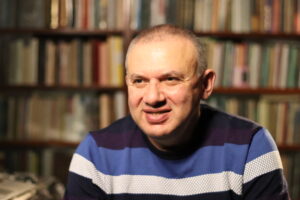 Boris Lanin
Boris Lanin
(Univerzita Adama Mickiewicza, Poznaň)
29 October 2025 (Wednesday) at 14:00 CET
Institute of World Literature SAS + online
Join Zoom Meeting:
https://us06web.zoom.us/j/21683068496?pwd=UULbZvQwEQUallebWBp16ovk6RJOXy.1
Meeting ID: 216 8306 8496
Passcode: 974210
This presentation explores the concept of avatars and technological artifacts in the dystopian fiction of Vladimir Sorokin, focusing on Day of the Oprichnik and Telluria. Sorokin’s use of avatars, electronic devices, and symbolic objects highlights the interplay between technology, memory, and identity. The talk will draw parallels with earlier Russian dystopias like Zamyatin’s We, linking S-4711 to later digital avatars. Devices such as the “umnitsa” and tellurium nails serve both narrative and metaphysical functions, symbolizing control, ritual, and simulation. Holograms and robots are examined as tools of state power and as postmodern simulacra. Through grotesque, hyperbole, and parody, Sorokin critiques authoritarianism and the commodification of consciousness. His work ultimately reveals a world where technological advancement is entangled with myth, ritual, and the erosion of individual agency.
The talk will try to read Alexey Konakov’s novel Tabiya Thirty-Two through the lens of Johan Huizinga’s concept of homo ludens and the genre conventions of dystopian literature. Set in post-crisis Russia in the year 2080, the novel imagines a society rebuilt around chess as the cornerstone of cultural identity, a tool of state ideology, and a means of social control. The author explores how the image of the “playing human” — homo ludens — is transformed under a chess-centric dictatorship. Chess is reinterpreted not as a sport, but as a humanities-based discipline where academic and cultural contributions are valued above competitive success. The talk will draw on a wide theoretical framework, including Michel Foucault’s biopolitics, Pierre Bourdieu’s theory of cultural capital, Sigmund Freud’s notion of sublimation, and Antonio Gramsci’s theory of cultural hegemony. The condemnation of Fischer Random Chess (Chess960) is interpreted as a defense of orthodox cultural values against subversive thought. The novel demonstrates how play may serve as an instrument of discipline, sublimation, and ideological regulation while retaining the potential for critical thought and personal tragedy. This analysis underscores the uniqueness of Tabiya Thirty-Two as a work that fuses philosophical parable, dystopia, and cultural metaphor, making it a significant contribution to contemporary Russian literature.
Prof. Boris Lanin (Adam Mickiewicz University, Poznań) is a distinguished scholar in Russian and comparative literary studies. He was a visiting professor at the Kennan Institute, then at the Woodrow Wilson Center (Washington, D.C.), and at Institutes for Advanced Study (Paris, France; Waseda University, Tokyo, Japan; and Uppsala, Sweden). He has worked at Hokkaido, Stanford, Kobe, and Saitama Universities, as well as at the Alfried Krupp Institute for Advanced Study (Alfried Krupp Wissenschaftskolleg, Greifswald, Germany). He was also an Honorary Visiting Professor of the National Endowment for the Humanities at the State University of New York in Potsdam (2018), and a Visiting Professor at the British Academy (2005). He publishes widely in several languages, including Russian, English, Polish, French, Japanese, Korean, German, and Serbian. In addition to his academic research, he is known for his widely‐used literature textbooks for Russian secondary schools (grades 5-11). Over one million copies had been sold by 2022, before their banning for political reasons.